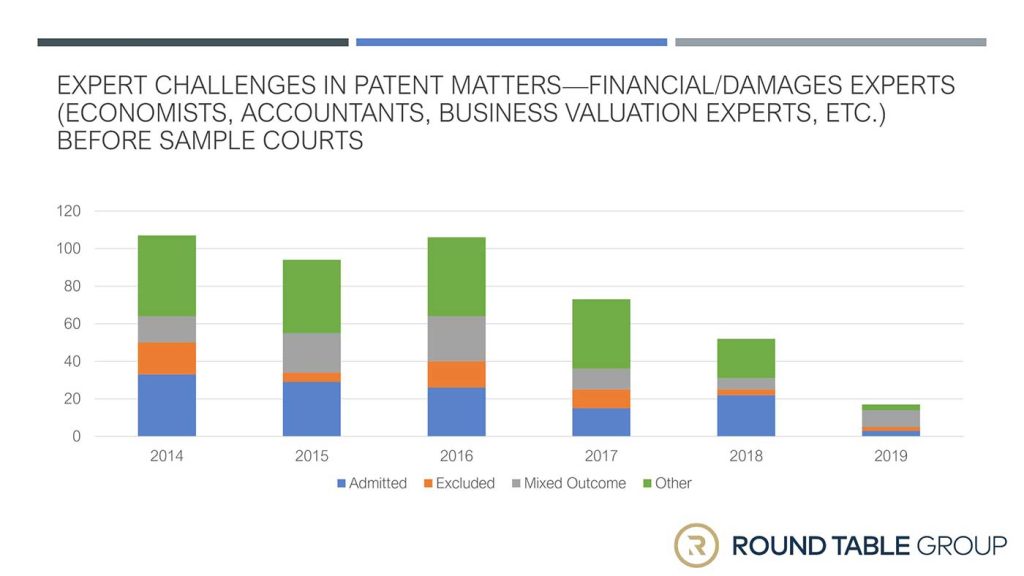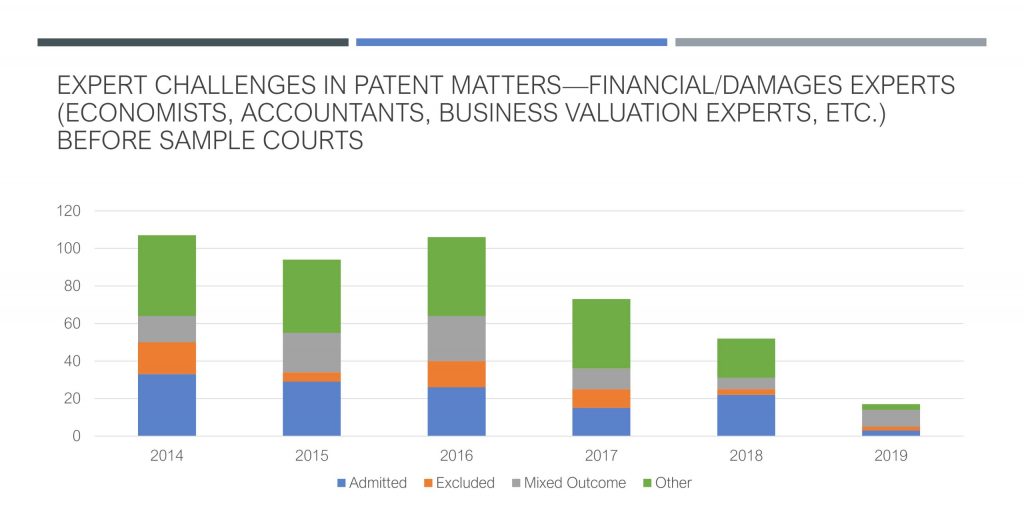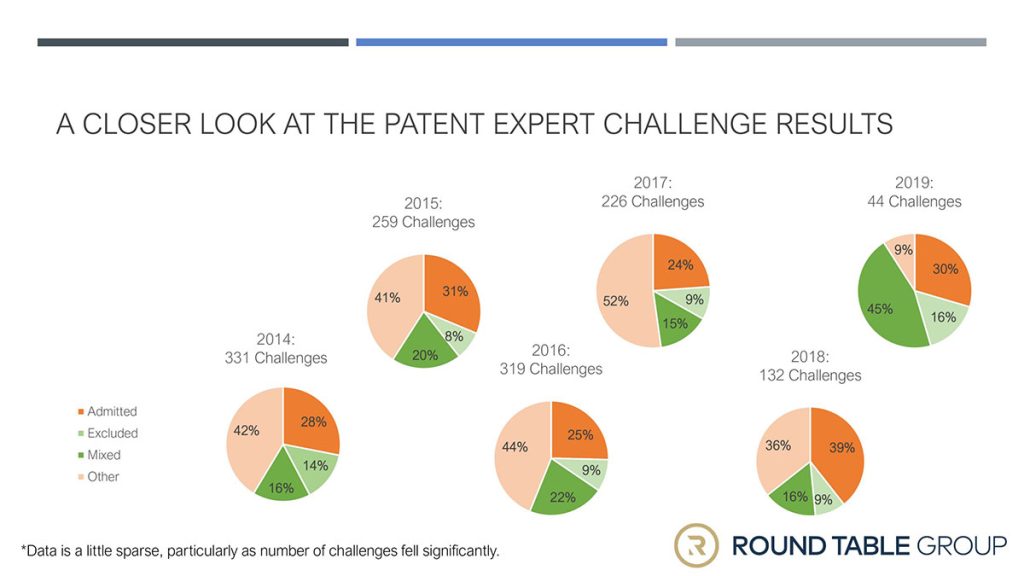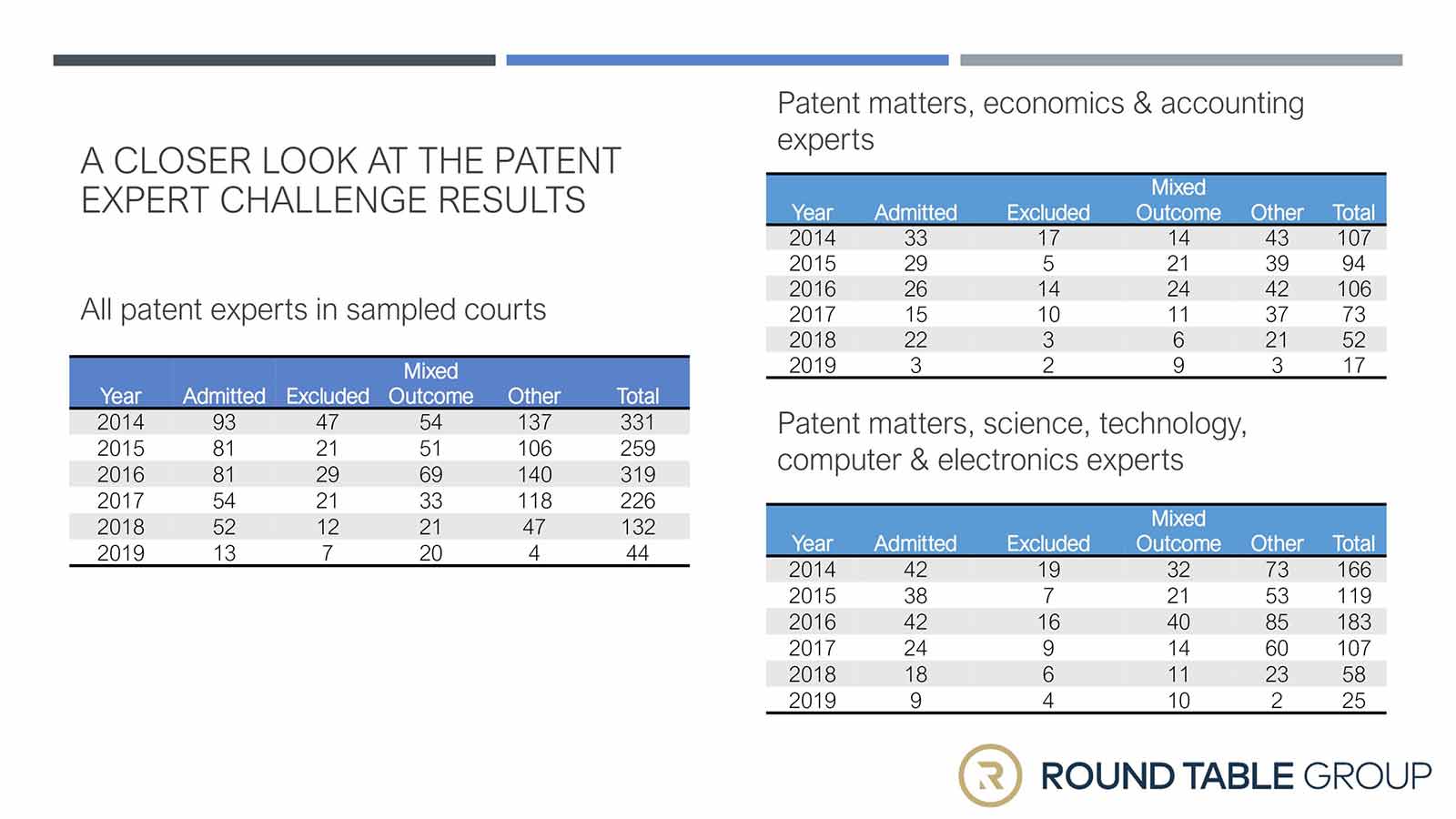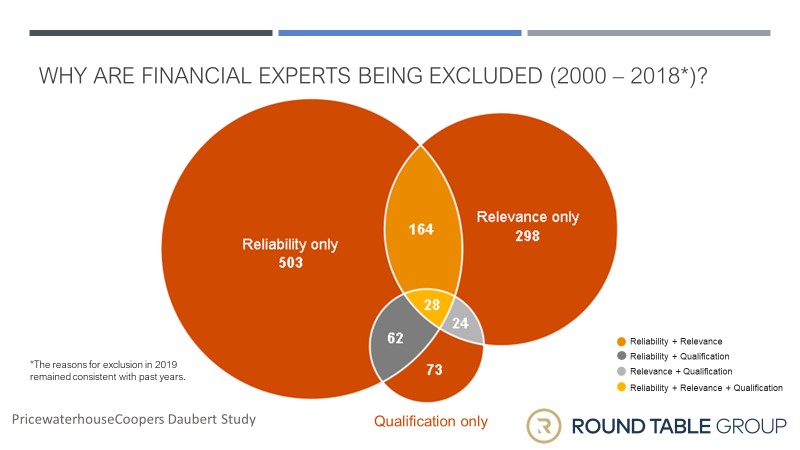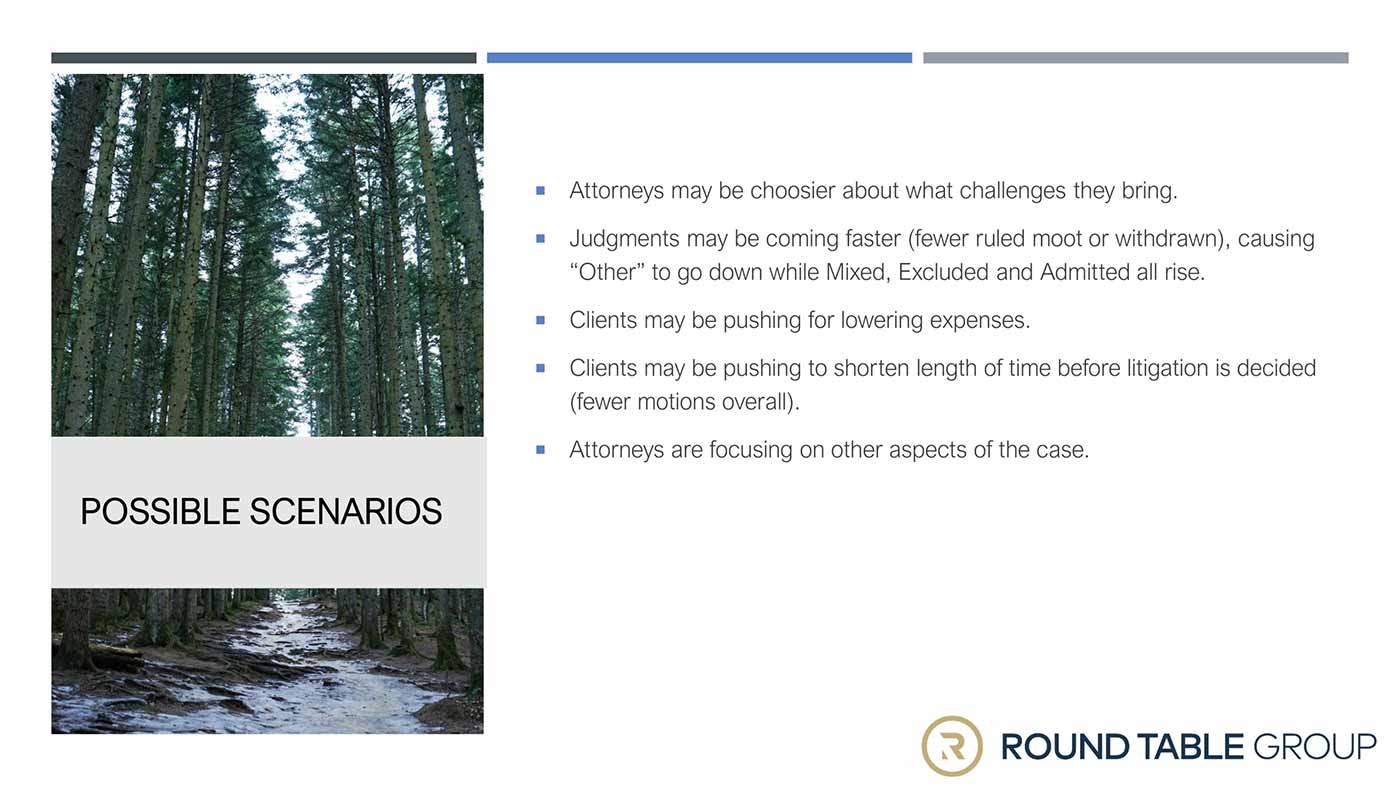Trends in IP Expert Challenges: Science, Technical, and Financial/Damages Experts

Round Table Group’s National Business Development Manager, Dan Rubin, was a panelist at the 24th Annual Berkeley Center for Law & Technology/Berkeley Technology Law Journal (BCLT/BTLJ) Symposium at the University of California—Berkeley School of Law on February 27, 2020. He presented on Trends in IP Expert Challenges: Science, Technical, and Financial/Damages Experts.
At Round Table Group, we have been connecting intellectual property (IP) attorneys in Silicon Valley and across the country with science, technical, and financial/damages experts for their IP litigation for over 25 years. Through our affiliation with Thomson Reuters/Westlaw over the years, we have had access to a treasure trove of data on litigation trends. I am going to share some of our high-level findings with respect to trends in Daubert challenges in intellectual property litigation, then drill down in detail into specific trends in patent litigation specifically, and the reasons for and results of those challenges.
- First, a few notes on the data. We looked at Daubert challenge data in IP cases from six IP litigation-heavy courts, from 2014 to 2019:
- United States District Court, D. Delaware
- United States District Court, E.D. Texas
- United States District Court, N.D. California
- United States District Court, D. New Jersey
- United States District Court, C.D. California
- United States District Court, N.D. Illinois
- All data is derived from Westlaw Edge’s Litigation Analytics.
- The data is a subset of court documents. Westlaw extracts its sample size from a randomly pulled sample each year.
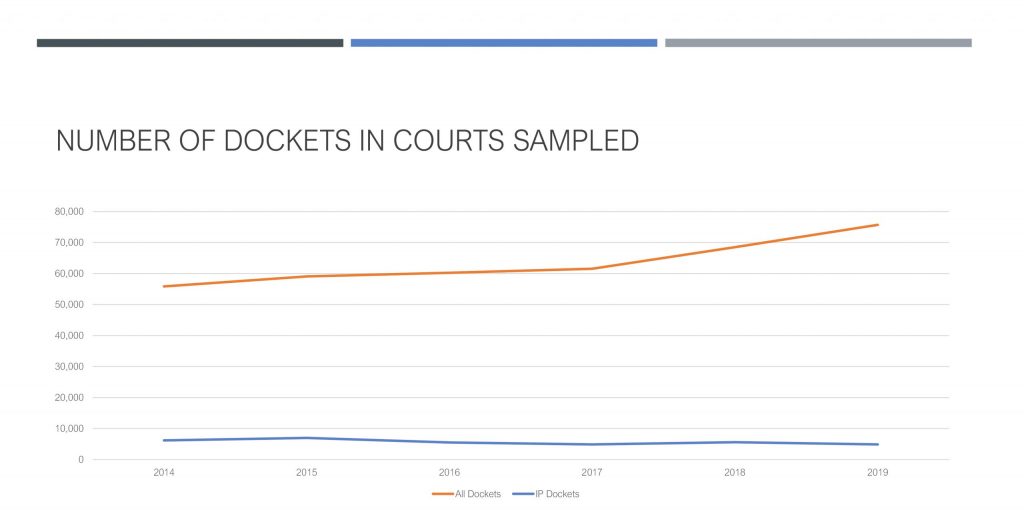 The number of dockets in all matters from courts sampled was close to 60,000 from 2014 to 2017. In 2018, that number increased to close to 70,000, and in 2019 to about 75,000. The number of dockets in IP matters from courts sampled ranged from 6,000 to 8,000 from year to year.
The number of dockets in all matters from courts sampled was close to 60,000 from 2014 to 2017. In 2018, that number increased to close to 70,000, and in 2019 to about 75,000. The number of dockets in IP matters from courts sampled ranged from 6,000 to 8,000 from year to year.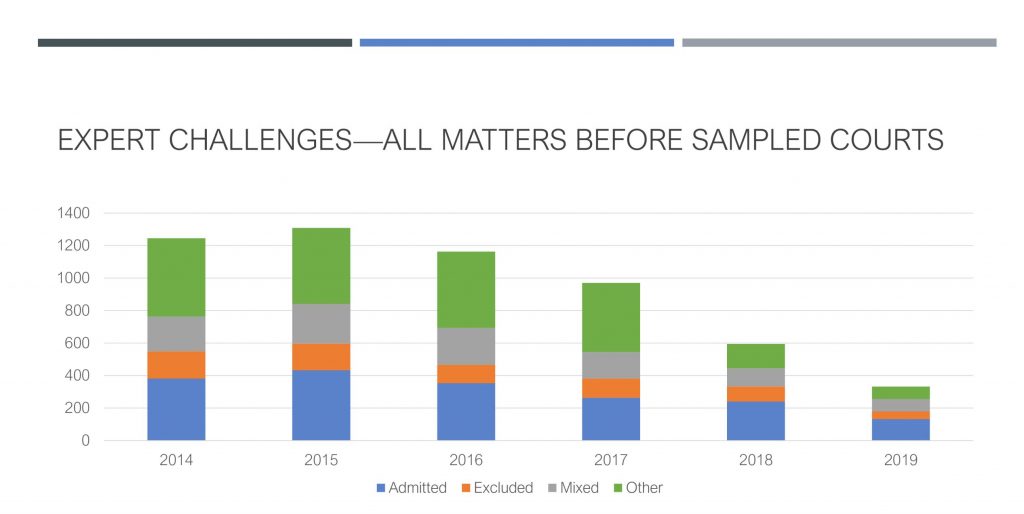
Starting with challenges in the sample courts in all practice areas, to expert testimony of all types: after an increase from 2014 to 2015, challenges overall decreased steadily each year thereafter, from 2015 to 2019. The trends in the results of these challenges—admitted, excluded, mixed*, and other**—tracked this decrease proportionally.
*mixed = admitted in part and excluded in part
**other includes denied as moot, withdrawn, and undetermined outcomes
Looking at patent cases specifically, and challenges to scientific, technical and financial/damages experts combined, after a decrease in challenges to these financial and non-financial experts from 2014 to 2015, and then an increase in 2016, there has been a steady decrease since 2016. The number of instances of expert testimony excluded declined each year, as well as the number of “mixed” and “other” outcomes, with a precipitous decline from 2018 to 2019. While the instances of expert testimony admitted stayed relatively the same between 2014 and 2016, and 2017 and 2018, they also precipitously declined from 2018 to 2019.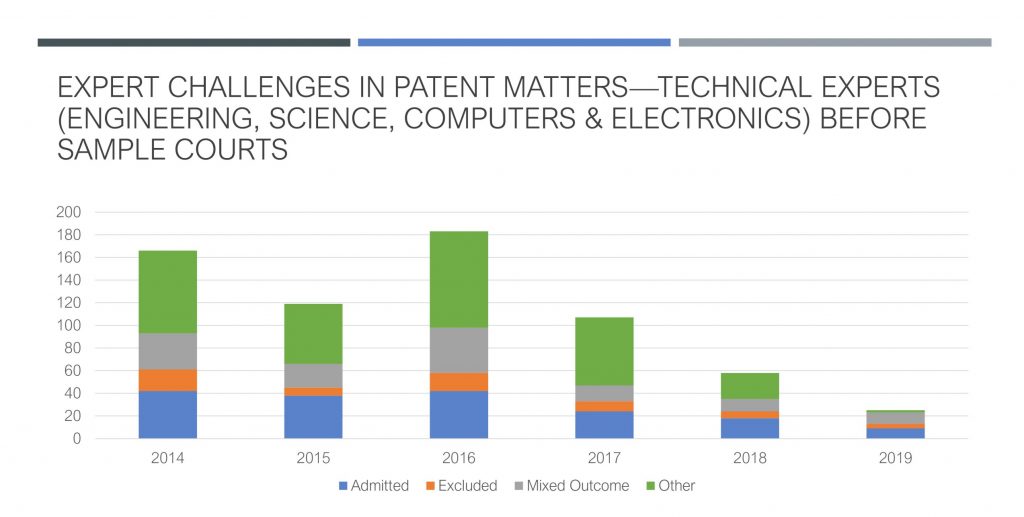
Looking at challenges to technical experts only (engineers, biotech, computer/electronics experts, and other non-financial technical industry experts), the trends are similar, both overall and with respect to the instances of expert testimony being admitted and excluded.
Looking at financial/damages experts only (accountants, economists, appraisers, statisticians, financial analysts, etc.), the trends were very similar, with a bit less of a change between 2014 and 2016.
We then drilled down further into the results of these challenges.
As we see, with the exception of an increase in 2016, the trend is steadily downward in almost all categories.
A Daubert study by PricewaterhouseCoopers specifically examined the reasons why financial experts were excluded in the 19-year span from 2000 to 2018.* PwC used a different methodology to identify these exclusions. They searched written court opinions issued between January 1, 2000, and December 31, 2018, using the citation search string “526 U.S. 137” (Kumho Tire v. Carmichael). This search identified 10,546 cases that involved 15,740 Daubert challenges to expert witnesses of all types. As a result, they identified 2,623 Daubert challenges to financial experts between 2000 and 2018.) Of the three most common financial expert types (accountants, economists and appraisers), accountants and economists were the most frequently challenged experts. Out of the 2,623 Daubert challenges to financial experts during that time frame, most often (503 times) the testimony was excluded due only to reliability (or a lack thereof) of the experts’ principles or methods underlying their testimony. Second most frequently due to relevance of the testimony only (298 times). Third, a combination of reliability and relevance (164). Fourth, qualification only (73). Fifth, a combination of reliability and qualification (62). Sixth, a combination of reliability, relevance, and qualification (28). And lastly, a combination of relevance and qualification. And lastly, a combination of reliability, relevance, and qualification (24).
*The reasons for exclusion in 2019 remained consistent with past years.
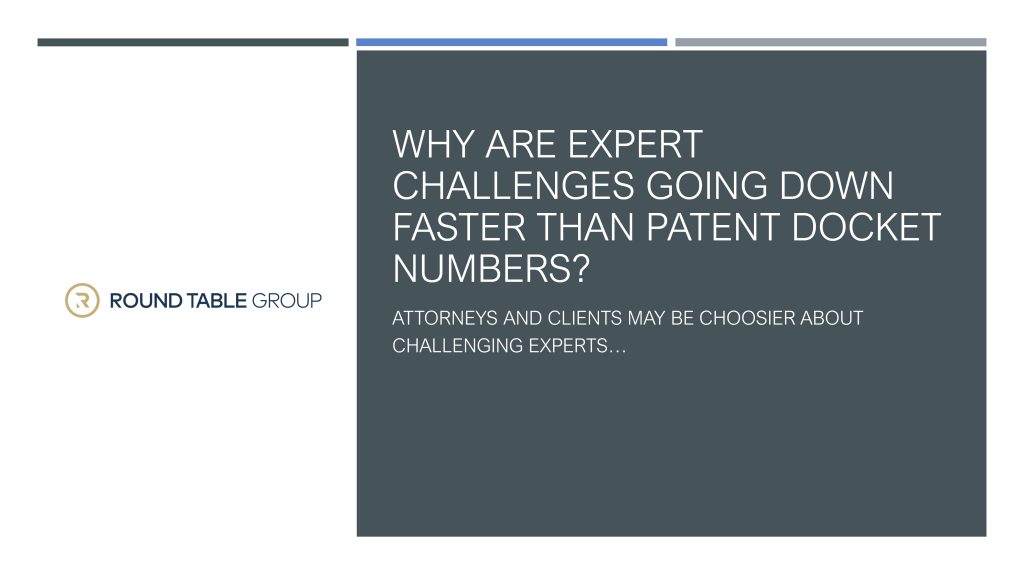 So, why are expert challenges decreasing faster than the patent docket numbers themselves? There are a number of reasons why this might be the case.
So, why are expert challenges decreasing faster than the patent docket numbers themselves? There are a number of reasons why this might be the case.
- Attorneys may be choosier about what challenges they bring.
- Judgments may be coming faster (fewer challenges ruled moot or withdrawn), causing “Other” outcomes to decrease, while “Mixed,” “Excluded,” and “Admitted” outcomes all rise.
- Clients may be pushing for lowering expenses.
- Clients may be pushing to shorten the length of time before the litigation is decided (filing fewer motions overall).
- Attorneys are focusing on other aspects of their case.
For questions about this presentation, or for help locating an expert for your litigation matter, please contact Dan Rubin.


